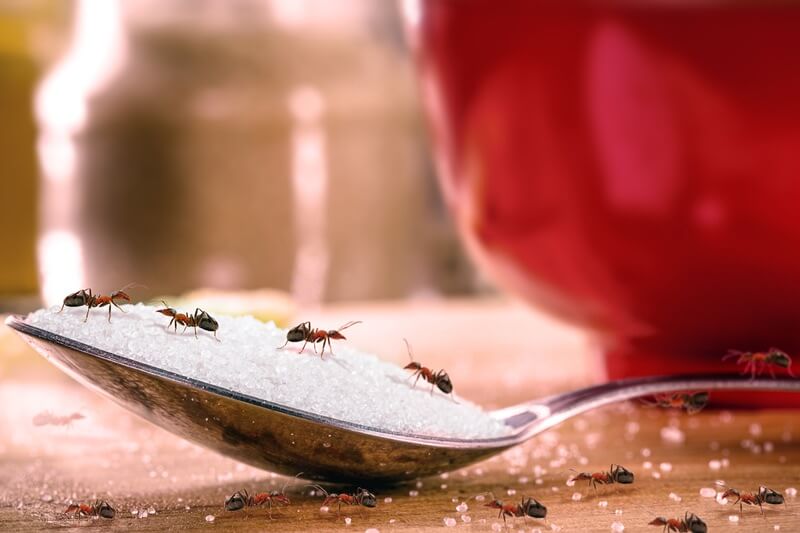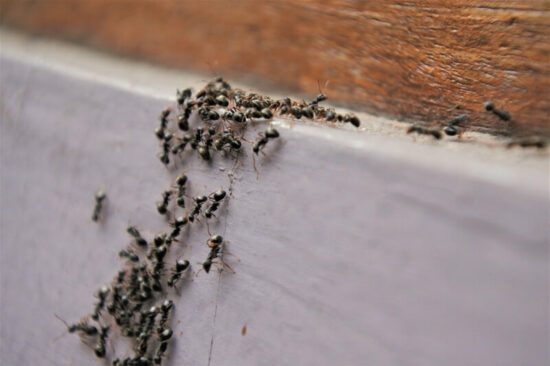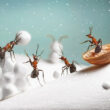If you’re serious about pest control, knowing what ants are attracted to is essential. These little insects are relentless and will show up immediately if you give them a reason to.
This guide will go over what attracts ants, so you can keep these insects away from your house.
Table of Contents
What Attracts Ants?
Ants are some of the most annoying pests to find in and around your home. While they play an essential ecological role in nature, the bugs are nothing more than pests when they enter your home!
Not only can they bite and sting, but these tiny insects can also damage items, cause allergic reactions, and spread potential disease. There are more than 12,000 different ant species in the world. While each one is unique, most of the variants you’ll encounter inside your home are attracted to similar things.
What are they? Here are some of the most common ant attractors that could be drawing these pests close.
1. Water
Like all living creatures, ants need a steady water supply to survive. If they don’t have a way to stay hydrated, these insects are quick to die. Furthermore, the entire colony will cease to exist.
- Kills common household ants including acrobat, crazy, ghost, little black, odorous house, pavement, and other sweet-eating ants
- As worker ants discover the bait, they share it with the rest of the colony to eliminate them all
- You should see a significant decrease in the number of ants visiting the bait stations within just a few days
- Place stations near areas where you’ve seen ant activity
Because of this, water attracts ants in a major way.
Your home is a treasure trove of water sources. You have all of the obvious places like kitchen sinks and bathroom faucets. But interestingly enough, ants don’t stick around those areas.
Thanks to you and your family’s regular use, they’re far too volatile. So, why do they enter your house?
If you have an ant problem in your home or even in your backyard, it could be because you have an undetected water leak. This scenario is pretty common. Homes have many pipes that are capable of rupturing and causing leak problems.
When that happens, the moisture damage is slow and steady. It could be behind the walls, providing easy access to ants and allowing them to remain unseen. Alternatively, you could have a dripping faucet or a leaky fixture causing tiny puddles of water to form on the floor.
Whatever the case might be, this source of water will eventually attract ants. Don’t be surprised if you see your ant problem worsen the longer you neglect to address the water issue.
2. Food
Food is, by far, one of the most common things to attract ants into a home. These bugs are on a constant lookout for things to eat. But they don’t just eat items and move on.

Ants are supporting massive colonies with hungry workers, growing larvae, and a queen that’s constantly laying eggs. The bugs are some of the most resilient around, and they’ll work hard for the betterment of the entire colony.
When one scout ant finds food, it’s only a matter of time before others come. The ants leave behind a scent trail, making it easy for other bugs to form an assembly line of food transport. One of the worst things to see in your home is a trail of ants coming in or going out.
Once you see that assembly line, they’ve already found food!
Ants typically are attracted to food sources in kitchens or dining rooms. But if you eat in the living room or bedroom, they’ll find that as well.
Expert Tip: These insects only need small crumbs to survive. As a result, not cleaning up after yourself can lead to a quick infestation. Always pick up food scraps, wipe down surfaces, and make sure that your home is spotless to avoid drawing these pests in.
3. Protection
Ants are surprisingly resilient and capable of defending themselves. Larger colonies will go on the offensive when necessary and protect the nest.
All that said, ants will always be attracted to any additional protection they can find. These insects like to move close to areas that offer natural safe spaces. While many nests are underground, they’re still vulnerable to would-be predators.
But that’s not the case with human-made structures. For example, many ants will establish nests and colonies in crawl spaces, basements, and other out-of-sight locations.
Expert Tip: You may even notice a line of ants moving into cracks in the foundation or small voids in the wall. Those spots offer more safety than any underground cavity ever could.
4. Flowers
That’s right! Those beautiful fragrant flowers could be the very thing that’s attracting ants to your house.
Ants are drawn to flowers for a few different reasons. One of the biggest is that they simply enjoy the fragrant smell and sweet nectar. A handful of flowers can attract ants with their sweet nectar alone.
Peonies and penstemon flowers are the worst offenders. However, any low-growing flowering plant that’s easy to access is fair game. The ants will enter the blossom like traditional pollinators and feed on the sweet nectar.
When this happens, you have a few different options for treatment. You can use all-natural solutions like diatomaceous earth to dehydrate and kill ants on contact. Some gardeners like to use insecticidal soap as well.
Either way, make sure you choose a solution that doesn’t harm your precious flowers.
Ants will also gravitate towards flowers outside. Luckily, many of the same treatment plans work there as well.
5. Plants
In addition to flowers, vegetable plants, herbs, and ornamental greenery could be attracting acts that you eventually have to deal with. Ants are prone to sticking around thriving house plants inside and gardens outdoors.
There are a few different reasons that plants are a draw. First, plants are a decent source of water. If you’re keeping healthy plants, you’re likely watering them regularly. Ants can take advantage of that habit and take some leftover droplets that accumulate on leaves or soil.
- Kills common household ants including acrobat, crazy, ghost, little black, odorous house, pavement, and other sweet-eating ants
- As worker ants discover the bait, they share it with the rest of the colony to eliminate them all
- You should see a significant decrease in the number of ants visiting the bait stations within just a few days
- Place stations near areas where you’ve seen ant activity
It’s a reliable way to survive!
Another compelling reason why ants are attracted to plants is because of aphids. Aphids are tiny wingless insects. They’re pretty tricky to see with the naked eye, but they love to attack healthy plants.
The aphids will emerge in the spring and feed on leaves by sucking out their nectar. Over time, aphids can cause considerable harm to a plant. But what’s the connection to ants?
Aphids produce a sweet nectar-like substance called honeydew. Ants go bonkers over honeydew! It’s a sweet honey-like gel similar to nectar and other popular ant food sources.
These insects will develop symbiotic relationships with aphids. The aphids continue to feed and secrete honeydew that ants will eat. In exchange for that food, the ants will protect the aphids from would-be predators.
It’s an example of entirely different insects working together to stay alive. That’s why you see ants hanging around plants so often! In some cases, it’s not the plant itself that ants are interested in. Instead, it’s the aphids and their honeydew.
Are Ants Attracted To Urine?
Here’s an oddball question that you might hear when dealing with ants. It seems off-the-wall. However, the question has historical roots.
Early physicians in a few different cultures observed ants gravitating towards the urine of people with a mysterious illness. That illness wouldn’t be officially discovered until many millenniums later. But many historians believe that the disease was Type 1 diabetes.
When someone has diabetes, glucose can’t travel to cells in the body that need energy. Instead, it gets trapped in the blood and moves towards filtering organs. Eventually, those organs will stop functioning correctly.
The result is large amounts of glucose, also known as sugar, in the blood. Ultimately, the condition makes urine sweeter.
Early doctors had no idea what they were dealing with at the time. However, the observations about ants being attracted to urine stuck around. It became an old wives’ tale that persisted until the official discovery of the disease.
Ants can be attracted to urine, but it’s usually the urine of someone with diabetes. They don’t have a particular affinity for healthy urine. In fact, many will move away from it due to its acidic nature.
They might use it for hydration in dire situations, but most ants ignore urine unless it’s high in glucose.
If you or someone in your family has diabetes, ants could feel drawn to bathrooms. Leaking fixtures might spread the scent, calling the pests in.
The best thing you can do is flush every time and ensure that urine isn’t getting on the floors. You should also avoid urinating outside to prevent ants from getting close to your house.
Are Ants Attracted To Salt?
We’ve already established that ants are highly attracted to sugar. Whether it’s from flower nectar, aphid honeydew, or blood glucose in the urine of a diabetic person, ants will go to great lengths to get a taste of sugar.
But are ants attracted to salt?
The relationship between ants and salt is a unique one. Salt is an important mineral for all living creatures. It’s vital to many biological functions, and animals need it to stay healthy. That includes ants.
Scientists have discovered that some ants will chase after salt more than sugar. But that doesn’t necessarily mean that ants in your yard will go after a few stray morsels that fall onto your floor during dinner time. The affinity for salt depends entirely on the ant’s location and lifestyle.
Studies found that ants living more than 60 miles from an ocean are more likely to seek out salt than sugar. We’re still learning more about this behavior, but it’s because they don’t have a natural source of salt available to them.
Many ants living far away from ocean coasts will get their sodium from other sources. For example, some ants will feed on other insects or dead animals. In those cases, the insects tend to ignore salt and similar spices.
But the ants that don’t eat other insects tend to seek out salt to remain healthy. Because salt is such a common spice in homes, those ants are more likely to be attracted to salt and invade your domain!
Conclusion
Now that you’re familiar with what attracts ants the most, it’s time to do some tidying up around your house. This is something that’s easier said than done, and we all can get a little sloppy from time to time.
But remember, ants are persistent.
The longer you put off taking care of the things that draw ants in, the more work you’ll have to do later!



